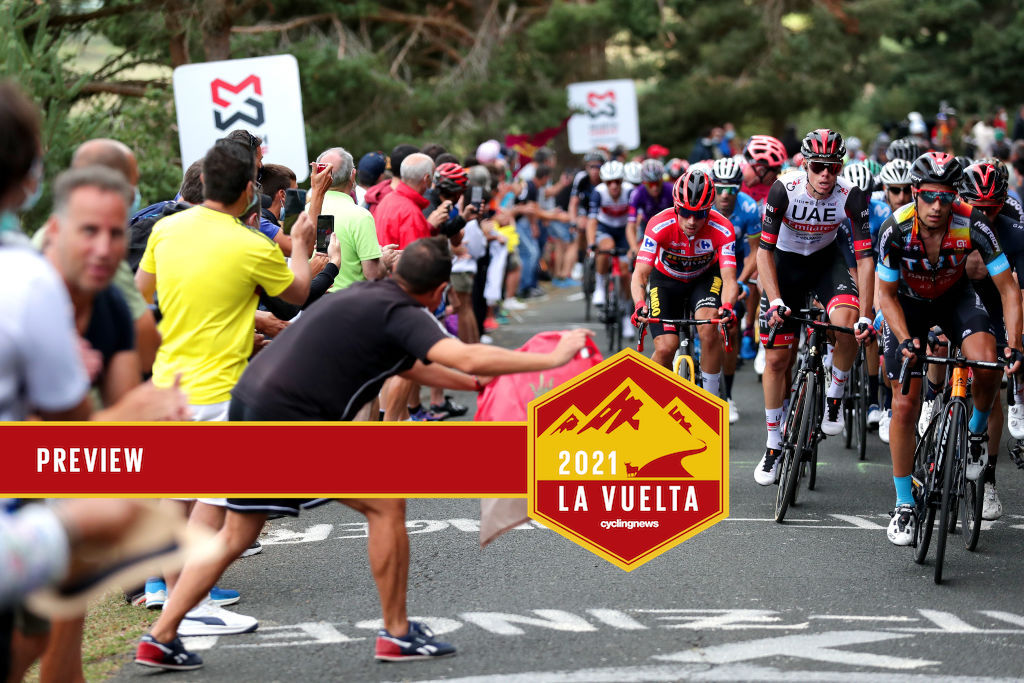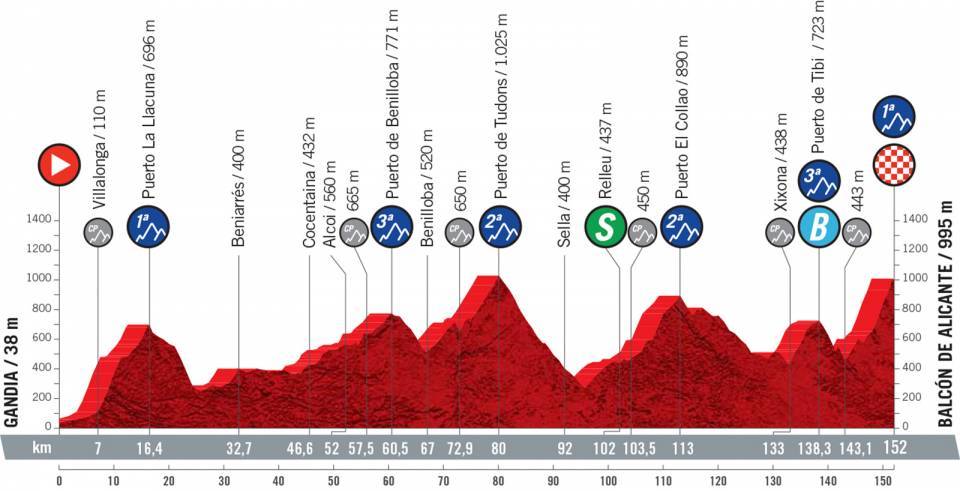Vuelta a España peloton braced for first full mountain stage - Preview
First-time summit finish of Balcón de Alicante on tough stage 7 trek through Alicante Sierras

And so it begins. After nearly a week of final climb skirmishing and fraught flat finishes, the Vuelta a España tackles its first full mountain day with stage 7 on Friday deep in the Mediterranean region of Valencia.
The Vuelta have criss-crossed the hills and mountains of southern Valencia on numerous occasions and their variety and difficulty ranges all the way from the short, punchy coastal ascent of Cumbres del Sol, one-time scene of a memorable duel between Chris Froome and Tom Dumoulin, to the interminably long, exposed inland ascent to the military base of Aitana.
These climbs are so familiar, in fact, that on paper the stand-out feature of stage 7 is the unprecedented first-category summit finish of the Balcón de Alicante, located on a wooded mountain-side high above the capital of Valencia’s most southerly province.
However, more than the final ascent per se, the real difficulty of stage 7 of the Vuelta is formed by the sum total of its collective climbing challenges.
Two first-category, two seconds and two cat 3 ascents are jammed into just 152 kilometres of racing on Friday and they jointly amass 3,670 metres of vertical climbing: for a first-week stage that’s a dauntingly high figure.
On top of that, the heat will be a big factor, says Fernando Ferrari, director of the well-known Spanish cycling website ciclo21.com which is based in Valencia.
“There’s not a single metre of flat all day and apart from the start, the racing’s all inland where the heat in this part of Valencia is much harsher than on the coast,” Ferrari tells Cyclingnews.
Get The Leadout Newsletter
The latest race content, interviews, features, reviews and expert buying guides, direct to your inbox!
“There’s a first-category ascent of La Llacuna straight away, too, which is really hard and for sure it will see the early breaks go.
“If this stage was later in the Vuelta, with all those second and third-category climbs, it would be the perfect day for a relentless full-scale GC battle.
“As it is, anybody not in great shape could lose a significant amount of time, but long-term it probably won’t be quite as significant.”
Many of the climbs will be familiar to the pros, from the numerous winter training camps that teams have held in the Alicante and Valencia area, Ferrari says.
“I’m sure they’ll have used their training rides to check out the climbs on today’s Vuelta route. And from what I hear, most of the roads they will use are recently tarmacked and in good condition.”
What will be unknown terrain for almost any of the racers, though, is the final ascent to Balcón de Alicante, set on the south-easterly edge of the Sierra de Miagmó mountain chain and with spectacular views of the Mediterranean, and Alicante some 20 kilometres further away.
“It’s never been used before in a bike race,” says Ferrari, “and the road was specially tarmacked for the Vuelta. So that novelty will represent an extra challenge.”
One element of the climb will be something the riders have sadly grown used to in the wake of last year’s pandemic. The Balcón de Alicante climb is banned to fans this Friday, but that was not the case in 2020 on so many climbs because of the risk of contagion. Rather in the ultra-dry recent weather in the area, fire risks have been deemed too high to allow spectators access.

Where the fuse will likely be lit for the final battle in any case will likely not be on the Balcón de Alicante but on the immediately-preceding third-category Puerto de Tibi ascent, with its summit 14 kilometres from the finish. The 2001 Vuelta a España winner Angel Casero, who hails from the region, expects the effect of the Tibi and the previous climbs is that the front group at the foot of the Balcón de Alicante will number 50 at most.
However, the weeding out process from the previous climbs does not seem likely to continue immediately on the Balcon de Alicante. The first part of the climb averages a comparatively easy 6.4 per cent, and there is even a lengthy descent of around a kilometre a quarter of the way up.
However, there are narrow pinch points at its foot, too, which will almost certainly guarantee a ferocious fight for position and which could see the bunch lined out that much quicker.
After the gentle start, a second, shorter upward ‘step’ of a similarly unchallenging seven per cent then follows and there’s even another much shorter segment of false flat as the road loops underneath a major motorway, the Autovia del Mediterráneo before the main part of the climb beings.
Shortly after the motorway underpass, though, things change, and fast. The road dives into a morass of scrubby Mediterranean pinewoods, clumps of vegetation and past small, rocky cliff-faces, and as it does so it narrows and rears upwards with a vengeance.
It’s these last four, more densely wooded kilometres that really allow the Balcón de Europa, the 2021 Vuelta’s third of its nine summit finishes, to qualify as a category 1 ascent and to amass most of its 1,005 metres of vertical climbing.
Switching to nine per cent average gradients for one kilometre and then 10.5 for the next, the sing-track road features some brutally difficult hairpins of up to 14 per cent. Probably the most crucial part of the climb will be a segment of 12 per cent close to the summit. It seems all but certain that whoever succeeds in breaking away at this point will be raising their arms in victory after the short 300-metre downhill segment to the finish a little further on.
Overall, globally the Balcón De Europa may not be as difficult as the Picón Blanco, Monday’s first summit finish and being mostly in woodland, it is certainly not as exposed to the wind as the northern climb the riders faced four days ago.
But the sum total of the climbing on stage 7 is likely to take its toll, all the same. Above all it will badly tax riders energy levels just 48 hours before Sunday’s epic mountain grind through the sierras of eastern Andalucia, in what is very possibly the hardest single stage of the entire 2021 Vuelta. The real price they will pay from the Balcon de Alicante climb then, may only become evident on Sunday evening.
Alasdair Fotheringham has been reporting on cycling since 1991. He has covered every Tour de France since 1992 bar one, as well as numerous other bike races of all shapes and sizes, ranging from the Olympic Games in 2008 to the now sadly defunct Subida a Urkiola hill climb in Spain. As well as working for Cyclingnews, he has also written for The Independent, The Guardian, ProCycling, The Express and Reuters.
